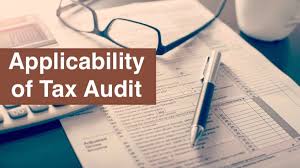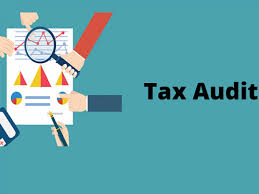
When Tax Audit is Applicable?
A tax audit is a process of verifying and validating the financial records of a business or an individual for tax purposes. In India, a tax audit is applicable to certain businesses and individuals as per the Income Tax Act, of 1961. Now we will further describe in brief the Applicability of Tax Audit in India.
The followings are the individuals and businesses that are required to undergo tax audit in India: (Tax Audit Applicability for AY 2023-24)
- Businesses with a turnover of more than Rs. 1 crore (or Rs. 2 crores for certain businesses) in the financial year.
Example: If a business has a turnover of Rs. 1.5 crores in the financial year, it is required to undergo a tax audit.
- Professionals with gross receipts of more than Rs. 50 lakhs in the financial year.
Example: If a doctor has gross receipts of Rs. 60 lakhs in the financial year, he/she is required to undergo a tax audit.
- Individuals who have opted for a presumptive taxation scheme under section 44ADA of the Income Tax Act and whose total income exceeds the basic exemption limit.
Example for Applicability of Tax Audit: If a freelance writer has opted for the presumptive taxation scheme and his/her total income for the financial year is more than the basic exemption limit, he/she is required to undergo a tax audit.
The purpose of a tax audit is to ensure that the financial records of the business or individual are accurate and in compliance with the tax laws. During the tax audit, a chartered accountant examines the books of accounts, financial statements, and other relevant documents to ascertain the correctness of the income and deductions claimed by the taxpayer. The auditor also checks for compliance with various tax laws, such as TDS, GST, and other relevant provisions.
Tax audit is an important process for ensuring compliance with the tax laws in India. It is applicable to certain businesses and individuals, and it helps to maintain transparency and accuracy in financial records.

Table of Contents
Section 44AB of the Income Tax Act, 1961
The following table shows the threshold limits specified in Section 44AB for different categories of taxpayers according to the applicability of tax audit.
| Category of taxpayer | Turnover/Gross receipts | Total income | Tax audit required |
|---|---|---|---|
| Businesses | More than Rs. 1 crore | Not applicable | Yes |
| Professionals | More than Rs. 50 lakhs | Not applicable | Yes |
| Individuals under | Not applicable | More than the | Yes, if total |
| Presumptive taxation | basic | income exceeds the | |
| Scheme | exemption | basic exemption | |
| limit | limit |
Section 44AB of the Income Tax defines the Applicability of Tax Audit in India as Follows
It is a provision that mandates tax audits for certain businesses and individuals. This section specifies the threshold limits for businesses and professionals, beyond which they are required to get their accounts audited by a chartered accountant.
As per Section 44AB, the following businesses and individuals are required to undergo a tax audit:
- Businesses with a turnover of more than Rs. 1 crore in a financial year.
Example: If a trading company has a turnover of Rs. 1.5 crore in a financial year, it is required to undergo a tax audit.
- Professionals with gross receipts of more than Rs. 50 lakhs in a financial year.
Example: If a lawyer has gross receipts of Rs. 60 lakhs in a financial year, he/she is required to undergo a tax audit.
- Individuals who have opted for the presumptive taxation scheme under section 44ADA of the Income Tax Act and whose total income exceeds the basic exemption limit.
Example: If a freelance writer has opted for the presumptive taxation scheme and his/her total income for the financial year is more than the basic exemption limit, he/she is required to undergo a tax audit.
The purpose of tax audits is to ensure that the books of accounts and other financial records of the taxpayer are accurate and in compliance with the tax laws. During the audit, a chartered accountant examines the financial records of the taxpayer and checks for any discrepancies or non-compliance with tax laws.
Section 44AB of the Income Tax Act, 1961 specifies the threshold limits for businesses and individuals beyond which they are required to undergo a tax audit. This provision helps to ensure compliance with tax laws and maintain accuracy in financial records.

Calculation of Tax Under Section 44AB of the Income Tax Act,1961
To calculate the tax liability under Section 44AB, the taxpayer first needs to determine the total income earned during the financial year. Total income is the sum of all incomes earned by the taxpayer from various sources, such as salary, business income, capital gains, and other sources according to the applicability of tax audit.
Once the total income is determined, the tax liability can be calculated using the applicable tax rates. The tax rates for different categories of taxpayers, such as individuals, HUFs, and companies, are specified in the Income Tax Act.
Here is an example to help understand how to calculate tax liability under Section 44AB according to the applicability of tax audit:
Suppose a business has a turnover of Rs. 1.5 crore in a financial year and is required to undergo a tax audit under Section 44AB. The business has a total income of Rs. 50 lakhs for the financial year. The tax liability of the business can be calculated as follows:
- Determine the taxable income: Total income – Deductions (if any) = Taxable income In this case, the taxable income is Rs. 50 lakhs (since there are no deductions).
- Determine the tax liability using the applicable tax rates: For a business with a turnover of more than Rs. 1 crore, the tax rate is 30%. Tax liability = Taxable income x Tax rate = Rs. 50 lakhs x 30% = Rs. 15 lakhs
Therefore, the tax liability of the business is Rs. 15 lakhs.
In summary, to calculate tax liability under Section 44AB of the Income Tax Act, the taxpayer needs to determine the total income earned during the financial year and apply the applicable tax rates according to the applicability of tax audit.

Applicability of Tax Audit Report as per Section 44AB of the Income Tax Act,1961
The audit report prepared under Section 44AB is called Form 3CA/3CB and Form 3CD. Form 3CA/3CB is the audit report that is prepared for taxpayers who are required to get their accounts audited under any other law, such as the Companies Act. Form 3CD is the statement of particulars that is required to be filed along with the audit report.
The audit report provides details about the taxpayer’s financial records, such as the books of accounts, profit and loss statements, balance sheets, and other financial statements. It also includes details about the taxpayer’s compliance with tax laws, such as the payment of taxes, filing of tax returns, and adherence to other tax-related provisions.
Here is an example to help understand what an audit report under Section 44AB may look like:
Suppose a business has a turnover of Rs. 2 crores in a financial year and is required to undergo a tax audit under Section 44AB. A chartered accountant conducts the audit and prepares an audit report that includes the following details:
- Details about the books of accounts maintained by the business, such as the method of accounting used, the nature of accounts, and the systems used to maintain records.
- Details about the financial statements prepared by the business, such as the profit and loss statement, balance sheet, and other financial statements.
- Details about the tax compliance of the business, such as the payment of taxes, filing of tax returns, and adherence to other tax-related provisions.
- Any discrepancies or non-compliance observed during the audit, along with recommendations for corrective action.
The audit report is then submitted to the relevant tax authorities as part of the tax audit process.
In summary, the audit report prepared under Section 44AB provides details about the taxpayer’s financial records and compliance with tax laws. The report is prepared by a chartered accountant and includes details about the books of accounts, financial statements, and tax compliance of the taxpayer.
Process of Tax Audit as per Section 44AB of the Income Tax Act,1961
Here is a simplified process of tax audit:
- Appointment of Chartered Accountant (CA): The taxpayer appoints a chartered accountant to conduct the tax audit. The CA examines the taxpayer’s financial records, including the books of accounts, financial statements, and other relevant documents.
- Preliminary Assessment: The CA conducts a preliminary assessment of the taxpayer’s financial records to identify any discrepancies or issues that may require further investigation.
- Verification of Transactions: The CA verifies the transactions recorded in the taxpayer’s financial records to ensure their accuracy and completeness. This includes checking the source documents, such as invoices and receipts, and verifying the arithmetic accuracy of the books of accounts.
- Compliance Verification: The CA verifies the taxpayer’s compliance with tax laws and regulations. This includes checking whether the taxpayer has paid the applicable taxes, filed the tax returns on time, and adhered to other tax-related provisions.
- Preparation of Audit Report: Based on the findings of the tax audit, the CA prepares an audit report in the prescribed format, as per the requirements of Section 44AB of the Income Tax Act, 1961. The audit report includes details about the taxpayer’s financial records, compliance with tax laws, and any discrepancies or non-compliance observed during the audit.
- Submission of Audit Report: The CA submits the audit report to the relevant tax authorities, along with the relevant annexures and statements, as required by law.
References for Applicability of Tax Audit in India
https://www.icai.org/post/approach-to-tax-audit-under-section-44ab-of-the-income-tax-act-1961
